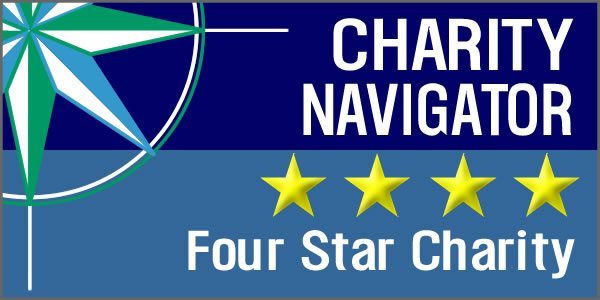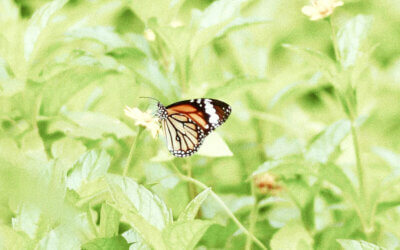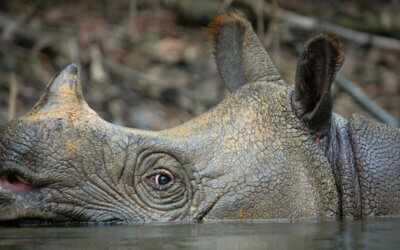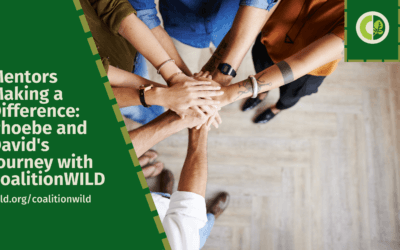2020 (bio)Diversity Interview Series: Amy Lewis
We asked WILD’s program directors to share with us their biggest hopes for our future and the obstacles they face to help us get there. Each week until the end of the year, our team will publish their answers to these, and other questions, in our year-end, (bio)Diversity interview series.
This week, we feature Amy Lewis and the role she is playing in helping to orchestrate the Survival Revolution.
What is the Survival Revolution and why is it needed?
The Survival Revolution is simple: it’s a growing, international movement of individuals aware of the fact that we need nature, that our survival depends on nature, and who are mobilizing in positive ways to defend nature and the future of humanity. This includes asking world leaders to protect half of Earth’s land and seas for wild nature, and to restore/rewild degraded lands and seas.
A few years back, I was fortunate enough to attend a week-long meeting with some of the boldest, brightest leaders in the environmental movement. It was truly exciting to be in the room with so many brilliant people, but as the week progressed I began to discover that as a conservationist I had a very different definition of the problem we were confronting than almost everyone else in the room. Countless times I was told that the real problem was about impediments to new technologies reaching scale or flawed implementation of economic models. No one spoke about nature. No one spoke about respect for nature and giving nature the space she needs to be wild, to thrive, and to support life, including humans.
During one of these conversations the topic turned to my work. I explained that I was a member of an international team working to protect at least half of Earth’s land and seas for the benefit of all life.
“Half of Earth’s land and seas? You mean like trees?” was the not-unexpected, and nonetheless lackluster response.
“Well, yes,” I answered. “And fish. And rainforests. And peat bogs. And prairies. And migratory birds. And rivers. And tigers. And rhinos. Because each of these things has an essential place on our planet, and by occupying that essential place they churn the living engine that has produced everything life needs most for nearly 500 million years.”
“Huh. That’s really old school, isn’t it?” And with that the conversation quickly returned to more “contemporary” matters born of human ingenuity and technological progress.
From this experience, and others like it, I learned that many people do not perceive nature to be relevant to their daily lives. Wild nature is not known and is certainly not understood. Few people recognize that every second of the day she is solving problems, maybe not for us, but we are her beneficiaries all the same. Problems like where we get our oxygen supply, our rainfall, our soil fertility. I learned that even some of the smartest people in the world don’t know what for me is a fundamental part of my conscious existence.
In short, I learned that nature needs a sustained campaign to inform the public of all the ways she improves our lives and to mobilize her allies in her defense, in our defense.
It was this knowledge that became the seed of the Survival Revolution. Now, in 2020, the Survival Revolution message is reaching 15-30 million people a month, and we are aiming to make that 100 million in time for the United Nations Convention on Biological Diversity. Overtime, I’m hoping that because of this campaign, not only do I start to have fewer conversations like the one above, but people actually start coming to me to inform me of all the ways they are supporting nature, giving her the space to thrive, and by doing so, defending humanity’s future.

That’s a lot of people: 15-30 million! What difference does that make for protecting Earth’s biosphere?
Before we started producing and sharing educational and outreach content with a network of influences, we tracked how many people around the world were posting social media about biodiversity or writing articles about it. And what we found is that very few people were actually talking about biodiversity in their daily lives. There were a handful of people in North America and Western Europe and that was it.
Now, because of Survival Revolution influencers – people who commit to use their social media account for one week a month to share campaign materials that educate the public on the essential role biodiversity plays in our lives and how protecting half the planet will help save biodiversity – we are seeing this conversation take place all over the world. India is a really big hotspot, but also South Africa and parts of South America. I hope to expand the conversation into Brazil over the next year.
These are big successes in such a short amount of time. But I bet there have been a few setbacks too. What were some of the early failures?
The biggest challenge is that we have to go from 0 to 600 so fast. The next ten years are of the utmost importance, both for climate and biodiversity, and nature is at the center of how we solve both those problems. So, I think the biggest challenge for me is reducing the gap between what is possible and what is needed.
Social science informs us that we need the support of 3% of the global population. That’s the threshold, 3%, where new policies tend to take hold of the institutional agenda. So that means we have to persuade about 250 million people around the world to champion protecting half. We aren’t anywhere close to that number, but we are 30 million closer than we were a year ago. Now we just need to accelerate getting there.
Realistically, what can one individual’s support do? Isn’t there a danger that people will feel that by signing a petition and pressing ‘like’ they will have done their part and they won’t take the next necessary steps?
For reasons I don’t fully understand, there are those who are cynical about the efficacy of grassroots campaigns, whether they involve signing petitions or persuading individuals to speak out about an issue with their friends and families. This historical record and the role of individuals have played in transformative change historically informs us that this cynicism is unjustified.
The environmental movement made some of its biggest, fastest impact in the 60s and 70s when the emphasis was on grassroots outreach and organizing. Beyond environmentalism, change has come due to the united voices of individuals, be it women’s rights, civil rights, decolonization, or LBGTQ rights. Individuals matter. Individuals’ voices matter. And when together, individuals speak out about the things that matter most to them, and 100 million or 200 million voices are calling for change – leaders listen.
I cannot tell you how many times I have encountered leaders or heard second-hand about leaders who know that protecting half is the right thing to do, but do not feel they have the political support to champion it. When we can bring that support to the table, when we can demonstrate that there are hundreds of millions of people urging leaders to protect half, that’s when we are going to start to see the change we need take place on an accelerated timeline.
And we cannot get there until we empower individuals, through educational outreach and coordinated calls-to-action, to speak up and to act up. That’s how the Survival Revolution works.
What are you most excited for in the next decade?
I’m excited to be at this historic and precarious moment in human history, this moment where we have the knowledge and aptitude to avert catastrophe and consciously create the future we want by respecting wild nature. I’m excited to be helping to empower others to create that change and to step into their roles as responsible agents and stewards of our common home, Earth, and the future. And I am excited for 2021 in particular where the world is going to come together at two different events, one at the United Nations and one at the International Union for the Conservation of Nature, to decide how much nature humans need to survive. You can bet the Survival Revolution will be there, bringing with us all the voices of all the people around the world who know the answer to that question, and are expecting their leaders to act on that knowledge.
Read Next
A Reflection by Timothy Hass, WILD’s Trustee
I know that for many people, venturing into wilderness areas is a very important element for health and balance in their lives. I feel this as well, but also, for me, the nature directly around me is equally important.
Tech & Tradition – Q&A with Ruari Bradburn, Chief Technology Officer at Langland Conservation
“Tech & Tradition” delves into the evolving landscape of conservation, exploring the synergy between traditional wisdom and technological innovation.
Mentors Making a Difference: Phoebe and David’s Journey with CoalitionWILD
At CoalitionWILD, we believe in the power of mentorship and the transformative impact it can have on the lives of young conservationists. Here, we shine a spotlight on two exceptional repeat mentors, Phoebe Barnard and David Manski, who have been actively involved in our Global Mentorship Program. Their dedication, wisdom, and passion for conservation have inspired and guided numerous young professionals on their journey to become future leaders in the field.
 BECOME A MEMBER
BECOME A MEMBER
Join the WILD tribe today!






0 Comments